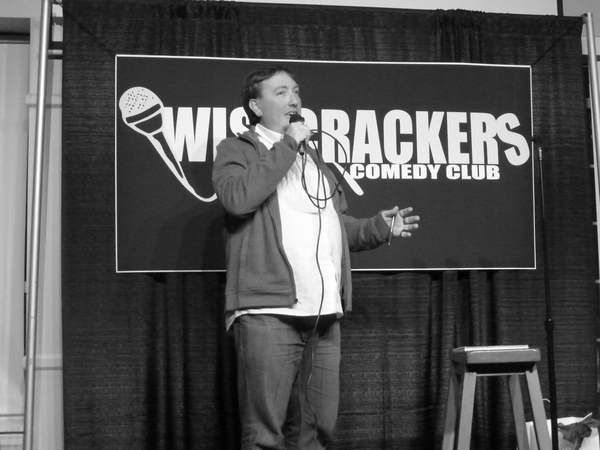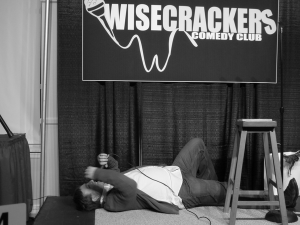
I’m at the very start of my time as a stand-up comedian. Ever since I was a kid, stand-up has been sacred to me. I remember in high school spending many weekend nights watching Robin Williams Live At The Met with my friends. That’s what we did while other kids were out drinking. We watching Robin and Monty Python Live At The Hollywood Bowl over and over again, memorizing every line.
I moved to Japan for a year after high school, and watched Fawlty Towers for the first time, thanks to an American friend who loaned it to me. This was Python but angrier, with John Cleese using television to send up and tear down the society around him, sparing no one.
When I got home from Japan in the summer of 1992, the first thing I watched, after a year of seeing very little English-language programming, was George Carlin’s Jammin’ In New York. I can still remember sitting on the couch at my parents’ house in Canandaigua, laughing until I ached. To this day I don’t think I’ve ever laughed at anything as hard as I did at that first viewing of Jammin’. Having spent a year in Japan, I was also starting to think of politics – especially American politics – in a different light, and Carlin’s razor wit and insightful commentary were perfectly aligned with my new understanding. In high school I’d taped battle maps from the Gulf War on my wall. A year later, I was ready for George to tell me that the war had been unjust and racist.
During my brief time in college, I worked at the campus radio station. This was the early 90s, so there was still a decent vinyl collection at the station, including some comedy. I don’t know why, but for some reason I was attracted to a copy of Thank You Masked Man by Lenny Bruce, which was a sort of greatest hits collection of some of his sketches. I don’t think I’d ever heard of Lenny, nor did I realize Carlin’s debt to him. My friend Mike and I played Lenny’s “Captain Whackencracker” sketch on National Smokeout Day, for reasons that will become apparent if you check out the sketch. Then, in a tiny CD and record store in Potsdam, New York, I found a copy of Lenny Bruce’s Berkeley Concert, which Frank Zappa’s record label had released the year before. I bought it, and it changed everything for me.
Whereas Robin Williams’ comedy was mostly about manic energy and creativity, and Carlin’s was a direct examination of the current political scene, Lenny’s comedy, especially by the time of the Berkeley Concert, was an almost postmodern take on the job of the stand-up comedian. Yes, he excoriated those in power, but he spent just as much time with a painstaking examination of the American legal system, and his own battles with it. I listened to the CD dozens of times. By now, I must be in the triple digits. I knew – and know – every word, every pause, every breath, every verbal tick, every crowd reaction. I didn’t know comedy could be like that. I wanted more. I found everything I could get my hands on by Lenny and devoured it all.
 Over the years, I’ve done a ton of public speaking. I’ve run for office, worked as a radio DJ, run the bullhorn on picket lines, hosted several poetry series, and just generally spent a ton of time speaking in front of people. I usually try to be funny, and many times over the years people have approached me and said I should be a comedian. I’ve always thanked them politely, but in my head I’ve known that it’s different to be funny in a room of your friends, or when people aren’t expecting it, than it is to be intentionally funny when people have paid you to make them laugh. Other than a couple open mics in the early 2000s, I’ve always stayed away from doing stand-up. It’s too sacred, and I didn’t think I had what it took to make it.
Over the years, I’ve done a ton of public speaking. I’ve run for office, worked as a radio DJ, run the bullhorn on picket lines, hosted several poetry series, and just generally spent a ton of time speaking in front of people. I usually try to be funny, and many times over the years people have approached me and said I should be a comedian. I’ve always thanked them politely, but in my head I’ve known that it’s different to be funny in a room of your friends, or when people aren’t expecting it, than it is to be intentionally funny when people have paid you to make them laugh. Other than a couple open mics in the early 2000s, I’ve always stayed away from doing stand-up. It’s too sacred, and I didn’t think I had what it took to make it.
Last year, through a fluke, I ended up as an MC at a comedy club in the small central PA town where I live. I was asked to do it by the owner, who’d seen me MC another event. I figured the stakes were very low, and if not now, when? So I said yes, wrote a few minutes of material, and auditioned. I got the gig.
The job of the MC is straightforward. I go out before the main comedians to warm up the crowd and get them ready for an evening of comedy. I do 5-10 minutes at the top of the show, then introduce the featured comedian. After the feature, depending on the mood of the room, I either do another few minutes or just bring up the headliner. After the headliner, I thank everyone for coming, take care of announcements and raffles, and that’s it.
I’m in my second season now, and this season my partner has often accompanied me to the shows. Seeing this comedy through their eyes has been very instructive. I’ve noticed how often I squirm in my seats as comedians take shots at women and people of various races, sexual orientations and gender identifications. I squirmed last season, too, but being there with someone I love, and who is a member of the LGBTQ community, heightens my discomfort. It’s easy to say why:
Comedy should punch up, not down.
Making fun of gay people, transgender people, women, latin@s, and others is worse than lazy. By which I don’t mean to say that anyone is safe from being the target of a joke. But jokes that come at the expense of people who are already disenfranchised feel, to me, like a waste of stage time. I’ve spent too many years listening to Lenny, Carlin, Maria Bamford, Bill Hicks, Margaret Cho, Richard Pryor, Simon Amstell, Tig Notaro, Hari Kondabolu, Stewart Lee, Eddie Izzard, Janeane Garofalo, Louis CK, W. Kamau Bell … and the list goes on. These are very different comedians, but what unites them in my mind is that they use comedy to point out the things that our society most needs to focus on, and the ways to make our world better. And they do it, not at the expense of the disenfranchised, but in the service of those who most need to spoken for.
I’m not trying to tell anyone what they should find funny. I’m not trying to tell comedians what’s OK to joke about and what isn’t. I’m just saying that for me, in this world we live in, comedy can be a powerful tool of transformation and uplift, as well as being funny. The more I hear people use their time at the mic to belittle and wound, the more I want to fight that with my own comedy. I’m at the very beginning of my comedy road, but I’m trying to write material that I feel good about delivering. I want to get off the stage and be able to look my partner or any audience member in the eye and feel like I used my time well.
For years in my various studios I had just two photographs – Israel “Cachao” Lopez, a Cuban bassist, and Lenny Bruce. Whenever I wrote, I always imagined Lenny watching me, and I always tried to write in a way that would make him proud. I lost that photograph in a move several years ago, but I haven’t lost the image, or the desire.
Jason, your honest self-reflection is a huge asset to your future, no matter whether you are making people laugh or not. Thanks for this great post.